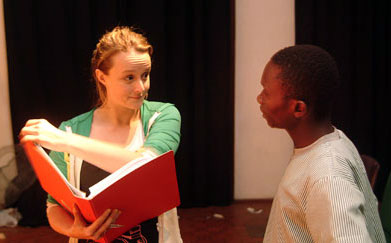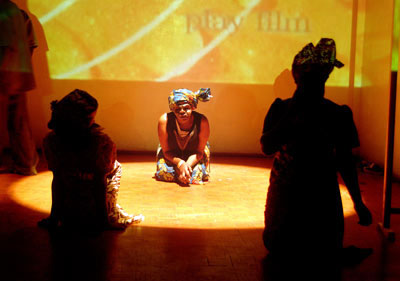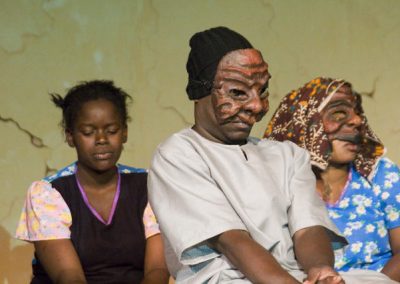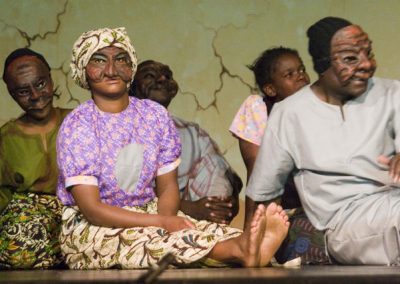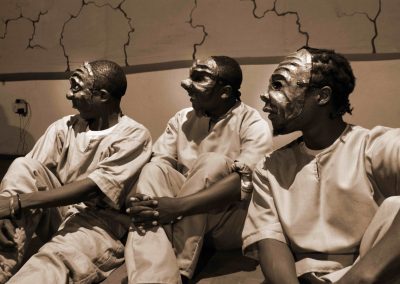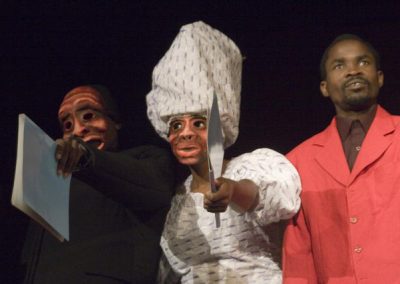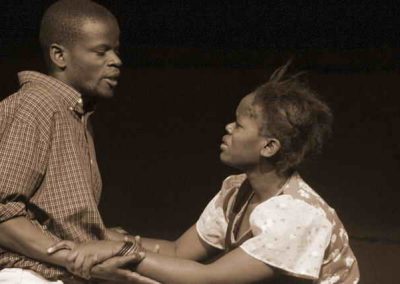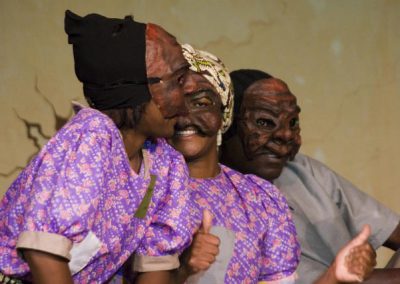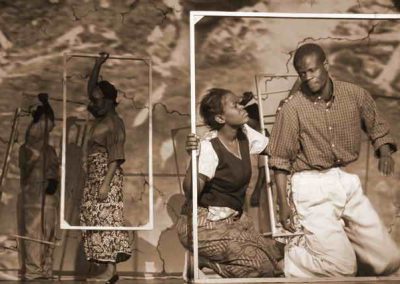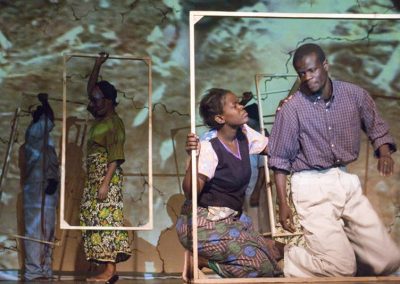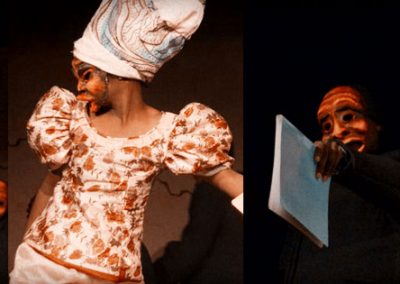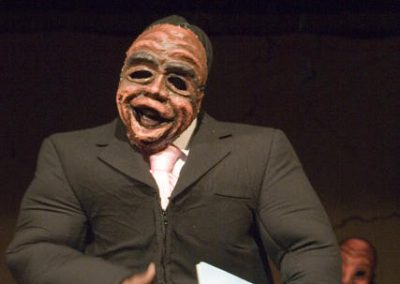
Accidental Death of Democracy
‘Democracy on Trial’ The programme as a whole intends to raise important questions and debate about democracy in Malawi and contribute to the strengthening of democratic culture and thinking.
Nanzikambe is implementing a one year arts and development programme called ‘Democracy on Trial’. The programme as a whole intends to raise important questions and debate about democracy in Malawi and contribute to the strengthening of democratic culture and thinking. Through the programme, Nanzikambe aims to create experiences for audiences across Malawi that provoke thought and reflection on the power structures that govern life-at all levels of society. Underneath all the activities envisaged in the programme is the vision of a truly democratic leadership and society.
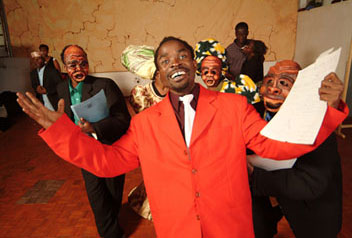
The program has focused on the following activities:
– Research, story development and training
– Peer education
– Community theatre & mobilization
– National/International tour and media campaign
Decision makers conferences; interactive debate and bridging the gap between the people and their leaders through taking the people’s stories to the leadership
Research
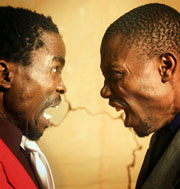 The research phase involved various elements such as literature review of current research of the state of democracy in Malawi, interviews with key stakeholders within leadership system, politicians, members of the civil society, NGOs, government officials, journalists and private traders, observing parliamentary sittings, gathering visual images of leaders in Malawi and how they are upheld in communities, gathering footage of past leaders and reading of various scripts and their discussion.
The research phase involved various elements such as literature review of current research of the state of democracy in Malawi, interviews with key stakeholders within leadership system, politicians, members of the civil society, NGOs, government officials, journalists and private traders, observing parliamentary sittings, gathering visual images of leaders in Malawi and how they are upheld in communities, gathering footage of past leaders and reading of various scripts and their discussion.
Reading of materials on democracy was one of the most vital initial processes done to acquaint the actors and the production team with the projects content and prepare them for the research and creative phases. They had to be thoroughly knowledgeable of what democracy entails and where democracy is in Malawi, its challenges and where the people’s feelings are as far as democracy is concerned. This process also helped with the formulation of questions later used for interviews with community members and local leaders during information gathering.
These people were encouraged to tell their stories and describe how they relate to power and the concept of democracy.
Research Interviews and Observation
As already stipulated above, this aimed at gauging perceptions from different angles on the state of democracy in Malawi. The initial interviews with key stakeholders and parliamentary observations were to assess the current political atmosphere and gather perceptions and stories that can be used in the writing process. The intention was to uncover as much of the truth from behind the political scenes as possible and enable us to depict the ways in which the Big Man Syndrome, corruption and other problems hinder the existence of a truly democratic and developmental state.
Questions for interviews included:
• What is the relationship between the state and the rural community/local governance systems?
• Is democracy really under threat in Malawi?
• Is democracy really the governance system most suitable for Malawi?
• What needs to happen to improve the system?
• Have levels of corruption within government changed in recent years?
• Can Malawi’s food security be attributed to the success of recent government policy?
• What hand do presidents play in the procurement of fertilizer?
• Who makes profits from the sales/purchases of fertilizer?
• How is fertilizer used as a political weapon?
• What messages and stories will expose what is wrong with the system?
All research materials were compiled before moving to the next creative phase where actors and the production team ventured into devising sessions and story development.
Actor Training and Development
Over the years, Nanzikambe has adopted a policy to provide in-house training and expose the actors involved in its projects to international standards of theatrical work. This is to provide training opportunities and upgrading of skills to many passionate artists who otherwise have no access to proper institutional training and inspire them to value and appreciate theatre as an important tool for social change and empowerment. Nanzikambe further aims at raising the theatre industry standards in the country and pioneer theatre that touches the heart of contemporary issues in society.
As such, during this programme, the actors underwent a training session with two professional body movement and theatre practioners respectively. Sam Moss, a British movement trainer took the group through intensive elements of Movement Dynamics, introducing the actors to various elements of body movement, telling story through body images and choreography. James Cunningham, a South African theatre practitioner drilled the actors in fundamental acting skills, miming and helped them understand the theatrical basics of what creates a powerful and engaging performance.
HIFA (Harare International Festival of the Arts)
As part of training and skills development, the production team and a selected few artists attended this year’s HIFA festivals in Harare Zimbabwe. The festival is a prestigious event that brings together productions and work of artists from all over the world. This therefore was an important opportunity for Nanzikambe and Malawian artists to meet other artists from all over the world, experience and learn from work, explore how that could feed into their work and also affect the way they perceive theatre in general. It was also a wonderful networking opportunity for everyone. While there, we managed to see various productions including ‘Blue Door’ a thought provoking play by an American group that poses sharp questions and counter-questions on contemporary black identity, I am my own Wife, another production from America about playwright who travels to Berlin to unravel the mystery of Charlotte von Mahlsdolf, a provocative and eccentric transvestite who survived both the Nazi regime and Soviet-controlled East Germany with charm, cleverness and deceit,
‘ECHO in the dark’, Vinegar Tom, Imagining Einstein, Invisible prison, Tumbuka wuth Okhela and many other exciting performances.
Rehearsals
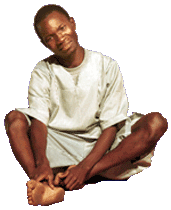 Led by Melissa Eveleigh, Nanzikambe’s creative director, this was an intensive eight-week exercise which saw the development of an invigorating theatrical piece from mere ideas and sparse games. Rehearsal period was mostly spent on improvisation, exploring and experimenting with various ideas, images and their presentation. The approach was ideal considering the vast nature of the project content. As such, actors were not merely told what to do and what to say but had an active role in the whole creative process. Their feelings and how they themselves relate to power and issues of democracy and governance were gradually fed into the play and the emotions and personalities of the characters. Through the same process of improvisation, the actors were also able to discover their roles.
Led by Melissa Eveleigh, Nanzikambe’s creative director, this was an intensive eight-week exercise which saw the development of an invigorating theatrical piece from mere ideas and sparse games. Rehearsal period was mostly spent on improvisation, exploring and experimenting with various ideas, images and their presentation. The approach was ideal considering the vast nature of the project content. As such, actors were not merely told what to do and what to say but had an active role in the whole creative process. Their feelings and how they themselves relate to power and issues of democracy and governance were gradually fed into the play and the emotions and personalities of the characters. Through the same process of improvisation, the actors were also able to discover their roles.
Grahamtown Trip
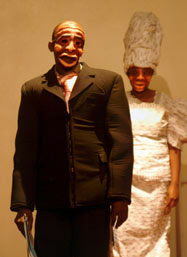 By mid June, the play ‘Accidental death of democracy’ was finalized. On Saturday the 23rd of June, the play was opened for a private viewing by journalists and a few invited guests. The following week on Tuesday the 26th of June, the Nanzikambe crew left for Grahamstown to attend and showcase the production at the National arts festival in South Africa. This was a ten-day trip and while there, the play was performed six times at Kingswood Theatre.
By mid June, the play ‘Accidental death of democracy’ was finalized. On Saturday the 23rd of June, the play was opened for a private viewing by journalists and a few invited guests. The following week on Tuesday the 26th of June, the Nanzikambe crew left for Grahamstown to attend and showcase the production at the National arts festival in South Africa. This was a ten-day trip and while there, the play was performed six times at Kingswood Theatre.
The play received a lot of media coverage in local festival papers and each performance was well patronized.
Besides performances, the group also watched a number of other performances including the famous Woza Albert; two of James Cunningham’s plays.
Cast
- Jafali Amadu
- Hussein Gopole
- Noah Albert Bulambo
- Mwayi Maloya
- Sandra Nay-Tay Chabaluka
- Mellisa Duncan
- Prisca Maston Gulo
- Geoffrey Mbene
- Robert Edward Magasa
- Peter Bob Makalanda
- Watupa Wyson Mtambo
- Joshua Chance Jones Bhima Mwalweni
- Misheck Mzumara
- Aaarone Ngalonde Nhlane
- Venessa Phiriast
Crew
- Production Artist: Gilbert Mpakule Assitant
- Production Artist: Hamilton Kameza
- Sound Design: Andrew Phiri
- Film Director: Villant Ndasowa
- Graphic Design: Luis Paulo
- Movement: Samantha Moss
- Sound Engineer:Chimwemwe Maloya
- Costume Artists:Macdonald Longwe , Andson Kawalala, Godfrey Mayeso
- Assistant Director: Shine Phiri
- Director: Melissa Eveleigh

